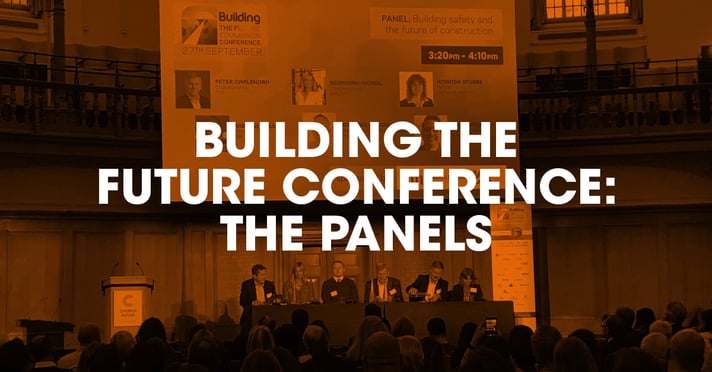Panel 1 – How is the net zero agenda transforming the built environment?
Andrew Reynolds – Global Chair, RLB (Rider Levett Bucknall)
Andrew believes we are 40-50% of the way to reaching net zero, but there’s opportunities to go further.
Many industry bodies are buying into the drive to standardise and collaborate, but unification is the key – not to wait for the government to act, but to act, and drive the change.
Andrew also believes there is a rise of new skills in the sector where cost managers are learning to measure not just the financial cost of a project, but its environmental and carbon cost.
He believes this kind of training should be mandatory, so that sustainability can be built into project early and as often as possible – too often it’s left too late into the build and design process.
Lynn Sullivan – Chair, National Retrofit Hub
Lynn focused firstly on economic forces, pointing out that assets (buildings) that cannot demonstrate resilience risk becoming stranded assets.
Auditors in the private and social sectors are auditing their stock for resilience (to climate change) and discarding stock – there will be a corresponding effect on what constitutes acceptable risk to investors.
Lynn also pointed out an exciting new trend in architecture and design – that contemporary design is rejecting the “20th century red herring” of unlimited air conditioning, and is now responding to a harsher, warmer climate of now the future without intense energy demand.
She is enthusiastic about how the concept of beauty in building in design will change to reflect the need to cool homes and workplaces with low energy consumption.
Lynn also mentioned that there is no reasonable expectation for the government to pay for all private stock to reach net zero standards.
Jimmy Close – Business Development Director, Mitek
Jimmy noted that house builders are taking a more holistic, solutions-based approach over a “component approach”.
There is a trend of willingness to take on challenges together, united, rather than just working as individual companies.
He says it’s great to see top house builders, who would normally compete against each other, coming together.
Karl Desai – Sustainability Manager, Lendlease
Karl offered the extraordinary stat that just 6% of their emissions fall into scope 1 and 2, and the rest are in scope 3. This underlines how much of a company’s footprint can fall outside of their direct control.
He pointed out that while regulation in catching up, embodied carbon remains a significant issue. Even just measuring embodied carbon is a significant issue.
Karl also stressed that it’s vital for entire companies to understand sustainability and net zero, and accept some ownership in the net zero process/
Simon Wyatt – Sustainability Partner, Cundall
Simon offered one of the more remarkable stats from the panel sessions – that if the UK did somehow bring the energy, aviation, and agriculture to net zero, there is enough carbon baked into construction to exceed the UK’s two-degree-Celsius target.
He insisted that the United Kingdom has been a leader of the move to net zero for a decade, but is at risk of losing its place as the EU and others take more proactive steps.
Pointing to where change will be driven, Simon focused on finance. Regardless of government regulations, it matters where the money comes from, and to access funding for new projects, sustainability and environmental goals have to be in place.
Simon also pointed out an area that we see little discussion of in the corporate world – now that many formerly full-time office workers are partly work from home, the concept of an office needs to change. Is the place where an employee spends 75% of their working time not now their workplace? Does a company not have a duty of care to that workplace as well?
Panel 2 – Building safety and future of construction
Suzanna Nicholl – Chief Executive, Build UK
Suzanna’s talk highlighted that change will be painful. She insisted we have the skills, the knowledge, and the systems to comply with the new regime brought in by the Building Safety Act, but we need more collaboration.
She believes that collaboration and successfully implementing the changes in the Building Safety Act could lead to an industry with better profit, productivity, and performance, and an industry the next generation want to work in.
Ben Smallwood – Major Projects Business Manager, LABC Warranty
While Ben’s talk was derived from the contents of our whitepaper exploring the potential impacts of minimum 15-year warranties on the construction industry.
Ben used his time to talk about accountability. Accountability leads to risk, and risk leads to insurance.
While the necessary secondary legislation around 15-year structural warranties hasn’t been introduced yet, it could have a variety of impacts.
It could mean longer SIP and DIP periods, amending the scope of coverage offered, or drive up premiums on new-home warranties if there are changes to standards.
Materials and products with 10-year warranties may need to be reassessed, which could drive up costs for manufactures. There may also be unforeseen impacts on the appetite for innovative materials, if the appetite for risk drives uncertainty and caution.
To learn more about the potential impacts of minimum 15-year structural warranties, you’re welcome to read out full whitepaper here.
Peter Caplehorn – Deputy Chief Executive, Construction Products Association
Peter insists that the product industry must recognise that they are about to enter a world where liability for products will extend backwards and forwards for 15 years, and need to look at how that will play out. He described it as a “brave new world.”
The challenge to the industry will be to make sure that the information will always be available to back up claims. Products need to be trusted, safe, and aligned with performance demands.
He says we also need consistent long-term planning where companies can invest, and the maturity of skills and processes can develop.
Andrew Mellow – Partner, PRP
While speaking to an audience that is clearly invested in responding to, and driving, changes in the building industry, Andrew insists there are organisations that don’t know about the upcoming changes.
All the same, there are businesses collaborating to standardise their approaches across the industry to create compliance checklists, which operate like a pilot’s checklist – if one box is unticked, the project doesn’t take off.
He insists we’ll see innovations, software, and applications developed to improve efficiency in response to these new responsibilities.
Amanda Stubbs – Partner, Trowers & Hamlins
Amanda said it was unclear just how the effects of the Building Safety Act will spring into action – for instance from April the Building Safety Regulator will start to call buildings in.
While their stated priority is to call in the biggest and highest-risk building, the regulator also needs to needs to show progress – so we can expect to see some quick wins called in as well.
Like many other contributors on the panel, Amanda talked about the shifting concept of risk in the UK housing world.
Attracting investment and finance, and the ability to deliver returns, will depend on managing risk for investors. In fact, even attracting residents and employees to occupy buildings will mean risk management.
Amanda explained that the focus should be on the bigger picture, not on individuals – the need to keep people safe, rather than become obsessed with minutiae of the Act.
Panel 3: People and process – how will digitalisation transform building
Paul Drayton – EAD, Laing O’Rourke
Paul insists that digital is not the future, it’s now It’s not all going to be a revolution, there will be marginal gains, which iteratively creep up.
He believes that perhaps we are trying to do “too much”. That every week, every month, there’s a supposed solution, and that now is a chance to simplify the agenda.
How is that achieved? Ruthlessness in choosing tools to solve problems, and be ruthless in assessing whether it’s working.
Paul also stresses that people are key and core to making digital tools a success. Digital literacy varies, so does comfort.
Maria Mamoura – Director in creative technologies, Bryden Wood
Maria says that we discuss evolution and disruption, the tech industry has created hype about new technologies. So pole are very excited, or very concerned. We tend to discuss them, but we don’t discuss the role of people in the journey.
Technology, according to Maria, is not a solution to a problem. Many people believe that technology will bring solutions like magic. But technology is just a catalyst for change, and people have to be on board with the technologies in the right way to share our environment.
Tony Wells – Chief Executive, Merit
Tony used his time to stress that anything we do, with regards to digitization, has to account for productivity.
Again, he stresses the need for people – he warns against measuring the return on investment of individual softwares, but measuring how digital transformation affects the work of people.
He explains that while the industry will look very different after embracing digital transformation, it won’t do to be satisfied with the broken model that we work with now.
In particular, he pointed out that the industry underestimates how much impact there will be on design – he believes that post digitalization, there will be a lot more design up-front before handover over to craftsmen.
He encouraged the industry to embrace transformation, and don’t fear the disruption.
Chris Bowie-Hill, Director of Innovation, Hydrock
Chris says that it’s an overwhelming task to adapt to the future of construction. It’s a huge task, so you look where the problems overlap.
When you don’t have the money to do everything all at once, you find a way to tick a few boxes at once – address fire safety, building safety, and decarbonisation in one swoop.
In addition, he advocates building data sets now. There can’t be any data-driven decision making without the data, and that means starting to ask people to incorporate data-gathering into their daily works, or extracting data from the work they’re already doing.
Like other commenters, he stresses the need for up-skilling, and to bring people along to manage and deploy a digital solution.
Over time, he says, the all-singing, all-dancing property manages itself is your “digital solution.” But eating an elephant is overwhelming – if you’re going to do it, do it one bite at a time.


Have your say